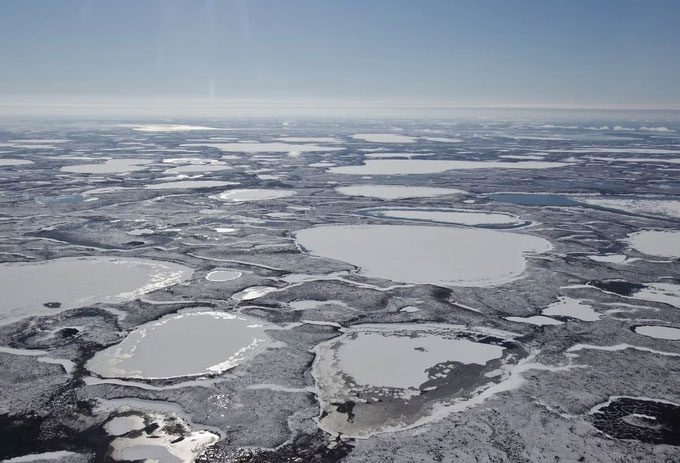Some ancient viruses trapped in the permafrost of Siberia since the Ice Age have been revived to address the consequences of climate change.
Recent scientific studies indicate that the massive melting of glaciers due to global warming could have profound impacts on the planet and humanity. Notably among these is the risk of “awakening” ancient viruses from the permafrost.
A recent project conducted by researchers from Aix-Marseille University in France has collected 13 types of viruses from 5 different lineages in Siberia – the icy Far East region of Russia.

Climate change leading to melting ice will bring unpredictable consequences. (Image: Getty).
Among these, there is a virus that has been “asleep” in the permafrost for approximately 48,500 years. According to Iflscience, published on November 23, this sets a new world record for the oldest virus ever revived.
Additionally, the research team also “awoke” 3 new viruses from a frozen woolly mammoth dung sample that is at least 27,000 years old, and 2 types of viruses isolated from the frozen stomach of a Siberian wolf.
According to the researchers, despite being found in the permafrost, these viruses contain dangerous amoeba, although less so than the unicellular organisms living in soil and water.
Subsequent experiments showed that the viruses still have the ability to invade cells and multiply, as well as become infectious pathogens when placed in suitable environments.

Many ancient viruses still “sleeping” under the permafrost, waiting to be awakened. (Illustrative image: BBC).
In the description of the research, Professor Jean-Michel Claverie, one of the lead authors, stated that collecting samples of ancient viruses is extremely important, yet very few studies have been published on this topic.
She explained that science needs to focus more on these viruses, as climate change is likely to awaken them from the permafrost in many regions around the world.
“Recent viral pandemics have shown that humans always need a certain amount of time to study and develop vaccines, as well as natural antibodies to combat them,” Professor Claverie noted.
“Therefore, considering the possibility that ancient viruses may find their way back and spread, potentially leading to a pandemic, is something that needs to be contemplated right now.”


















































